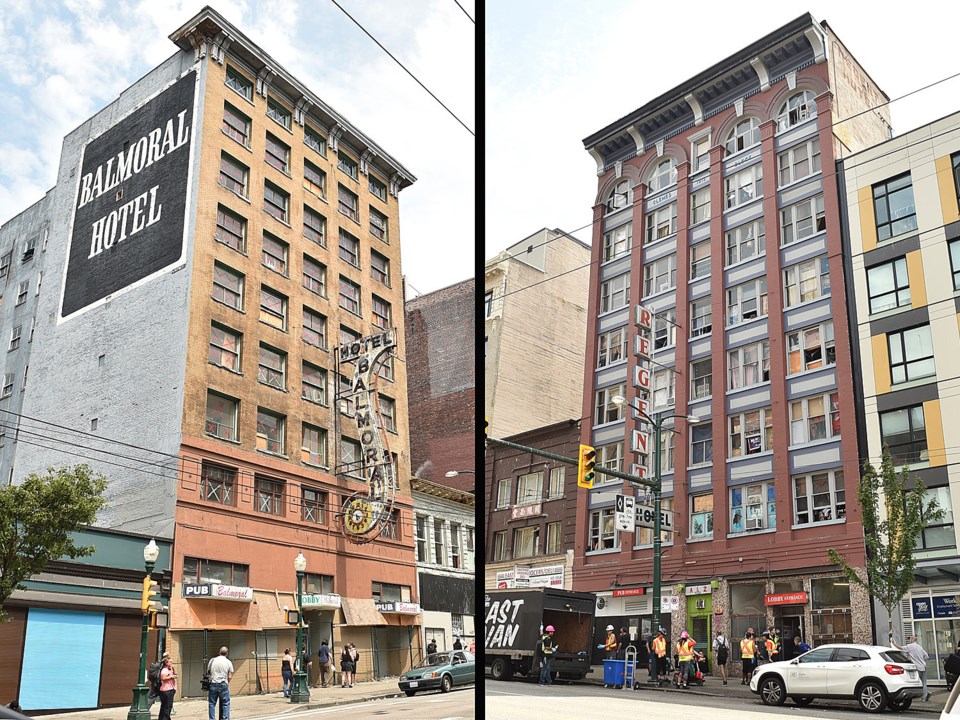The City of Vancouver has begun the process to expropriate two problem Downtown Eastside hotels—the Regent and the Balmoral—after its owners did not respond to an offer from the city to buy the buildings, which sit across from each other near Main and Hastings.
The single-room-occupancy hotels, which have been notorious for crime and disrepair for decades, are both vacant after engineering reports forced the city to deem the buildings unsafe and close them—the Regent last month, and the Balmoral in June 2017.
The closures forced the evacuation and relocation of more than 300 tenants.
The city announced Monday that it took the rare move to file an expropriation notice July 25 against the Sahota family, the owners of the hotels. The city did not disclose how much money it offered the Sahotas to buy the hotels, but noted it was based on a value determined by independent appraisals.
That value will factor in the expropriation process as next steps unfold, and may be what the city ultimately pays for the buildings, which have made the city’s top-10 list of problem hotels for almost 20 years and have been cited by police in numerous reports for drug activity and other crimes.
B.C. Assessment records show the property value of the Regent was $12.1 million in July 2017. The Balmoral was assessed at $2.6 million, dropping from the previous year’s value of $10 million. The drop was likely connected to the city’s closure of the hotel.
“Despite years of enforcement efforts by the city and hundreds of bylaw violation charges presently before the courts, the owners have not made the basic investments necessary to maintain safety and an acceptable standard of living for tenants in these two buildings,” the city said in a news release. “Given this ongoing mismanagement and the critical shortage of housing for low-income residents in Vancouver, the city is now taking action to acquire direct ownership of the two properties for the purpose of providing housing in the Downtown Eastside.”
Paul Mochrie, deputy city manager, used the word "extraordinary" to describe the city's move when he spoke to reporters Monday. He acknowledged the city routinely expropriates property for roads and infrastructure, but pointed out "this was the first instance in which the city is seeking property for the purpose of providing housing."
Wendy Pedersen, a housing advocate who has pushed for years for better living conditions for low-income tenants in the Downtown Eastside, described her reaction as “jubilant” when she heard the news Monday about the expropriation of the hotels.
Pedersen, a coordinator with the Downtown Eastside SRO Collaborative, said the move by the city came after years of advocacy from activists and tenants, including legal action against the Sahota family. She said the city’s action is a warning to other hotel owners.
“It’s a shot over the bow to all the slumlords in this city—that if tenants get involved to fight for their rights, they can lose their buildings,” she said. “This isn’t about the city, this is about us risking our lives, working day and night for years and tenants and advocates standing up for what’s right.”
The city’s decision to seek expropriation was not unexpected, after Mayor Gregor Robertson announced June 20 that he wanted the Regent and Balmoral “in public hands,” whether by negotiation or expropriation.
But for the city to successfully expropriate the buildings, there are still several legal steps that need to be taken, as outlined by the city. Here are those steps:
- The Sahotas and “charge holders” will be served with the notice of expropriation.
- The Sahotas will then have 30 days to request an inquiry with respect to the expropriation. If an inquiry is requested, the attorney general would appoint an inquiry officer to review the request for an expropriation to determine if it’s necessary to achieve the city’s objectives. That could take several months.
- At that time, a recommendation will be provided to city council.
- Following an inquiry, or if no inquiry is requested 30 days after the notice of expropriation is served, the expropriation will be considered by council. If approved by council, the city will pay a value based on independent appraisals for the two buildings and ownership will be transferred.
- The Sahotas will then have one year to file an application related to the cost paid for the building to request additional payment.
- A court hearing would determine if additional payment is necessary.
Though the mayor told reporters last month that no promises would be made that both buildings are salvageable enough to one day re-open for low-income tenants, the city said in Monday’s release that council has directed staff to explore partnerships with the provincial and federal governments on a plan to revitalize private single-room-occupancy hotels.
That plan includes the Balmoral and the Regent.
Despite city's move to expropriate, Mochrie said the city still plans to prosecute owners for more than 400 bylaw violations related to the hotels, with several court dates scheduled in October.
The Courier left a phone message at the Sahota family home Monday, but was not returned before this story was posted.
@Howellings



